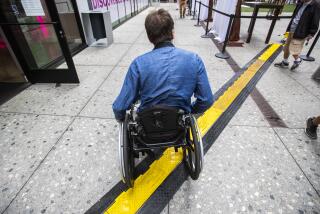Disability Insurance Tough for Self-Employed
- Share via
When Leianne Lee started her own public relations business last February, she didn’t think a lot about disability insurance. She bought health insurance through her former employer and otherwise just worked like crazy to get her home-based business off the ground.
But as time went on, Lee began to feel increasingly uneasy. What would happen if she became seriously ill and was unable to work for a while, she wondered. She’s single, so there’d be no second income to bail her out. She needed a safety net.
When she began to search for disability insurance, she found out what many self-employed people already know: It’s difficult, if not downright impossible, to buy disability insurance when you’re on your own--particularly if you operate your business out of your home.
Why?
“I’ll read it to you right out of the agent’s manual,” says Bob Leith, a Northern California-based agent for Northwestern Mutual Life. “Generally, individuals working from their homes are not acceptable risks for disability insurance due to the difficulty of establishing actual disability. When a claimant is unable to leave home to go to work, disability can more easily be established. When the residence and place of business are the same, this distinction is impossible.”
At a time when the numbers of home-based businesses are growing rapidly, the issue is of increasing importance. According to IDC/Link, a New York-based research company, there are now about 46 million people working from home. And the majority of those--26.7 million people, to be precise--are working for themselves either full time or part time rather than telecommuting for another employer. Because you are the company when you are self-employed, there are no company-paid benefits for even a temporary disability. As a result, some type of disability safety net is key for self-employed individuals--even if it’s elusive.
“It’s astounding,” says Lee. “I know that the number of people who are going into business for themselves is really growing, but yet the insurance industry doesn’t seem to be following along with that.”
But the disability insurance scene isn’t completely hopeless. Some self-employed individuals who have established long records of work and who spend at least a portion of their time meeting with customers outside their homes can buy insurance in the private market, Leith says. Doctors, dentists and salespeople who regularly meet with customers can usually secure coverage, he says.
In addition, some trade groups, in response to the growing ranks of independent contractors and consultants, have begun to offer insurance products too. The National Assn. for the Self-Employed, for example, offers both disability and health insurance to members. The rates vary based on the coverage amount and the occupation of the applicant. To even apply, however, you must be a member of the group. The association’s membership fee is $72 a year.
A few states, including California, also have disability insurance pools. Self-employed individuals can buy in by paying a premium.
For new business owners, however, these programs are often insufficient to provide a true safety net. The simple reason is that disability insurance benefits are determined based on the amount of income you earn. Whereas your monthly and annual incomes are easy to establish when you’re drawing a salary, it’s tough when you’re starting a new business, as profits and losses can vary wildly in the first several years. In most cases, insurers will not promise a set benefit unless you have a fairly lengthy record of steady earnings.
For instance, Unum Life Insurance Co. of Portland, Maine, will write disability coverage for self-employed people--even when they work from home--but only after they’ve established a history of stable income from self-employment. Normally that takes at least three years, says Russell W. Anderson, senior vice president of individual disability.
The California Employment Development Department also will allow in-state residents to voluntarily sign up for state disability insurance when they are self-employed. But benefit payments are based on your income from your business two years before you became disabled. In other words, if you started your business in 1995 and became disabled in ‘96, your state disability benefit would be based on the company’s net income in 1994, which, of course, doesn’t exist. As a result, you’d get only the minimum benefit, which currently is about $51 per week.
The bottom line: You may have to create your own safety net for the first few years of operating your business. You can do that by saving a substantial amount of money before you get started, by relying on relatives or by securing a personal line of credit that can be tapped if you are unable to work for a long period.
*
Kathy M. Kristof welcomes your comments and suggestions for columns but regrets that she cannot respond individually to letters and phone calls. Write to Personal Finance, Los Angeles Times, Times Mirror Square, Los Angeles, CA 90053, or e-mail to kristof@news.latimes.com on the Internet.
More to Read
Inside the business of entertainment
The Wide Shot brings you news, analysis and insights on everything from streaming wars to production — and what it all means for the future.
You may occasionally receive promotional content from the Los Angeles Times.










